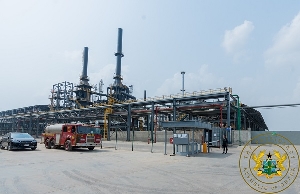 Ghana’s first private oil refinery is owned by the Chinese
Ghana’s first private oil refinery is owned by the Chinese
President Nana Addo Dankwa Akufo-Addo on Friday 26 January, 2024 commissioned Ghana’s first private oil refinery, built by the Sentuo Group, Ghana, a Chinese conglomerate, in the Tema Industrial Area, near Accra.
The US$2 billion Sentuo Oil Refinery has an initial processing capacity of 40,000 barrels per day, scalable to 100,000 barrels when the facility is fully operational.
The facility is expected to be completed this year and will operate at a production capacity of five million barrels per year.
At a colourful ceremony, President Akufo-Addo said the development was a significant milestone in Ghana’s journey towards energy independence, industrialisation and economic prosperity.
“This project represents not just the bricks and mortar but also a symbol of our determination to shape our destiny, strengthen our economy, reduce our dependence on foreign oil and inspire investment in our economy,” he said. Local production for Ghanaians.
The president, who was optimistic that Ghana would soon wean itself from reliance on foreign fuel for its energy needs, said the operation of the refinery would serve as a pivotal step towards securing the country’s energy future.
“No longer would we be relying on external sources for fuel. Instead, we will harvest our natural resources to fuel our progress.”
President Akufo-Addo said the refinery will not only provide the country with petroleum products but also create jobs and empower local communities, drive investment in related industries and contribute to the overall realisation of Ghana’s broader industrialisation agenda.
“By processing our crude oil domestically, we are creating opportunities to add value, transform raw material into finished products and increase the competitiveness of our manufacturing sector,” he said.
The president said the refinery stood as a good example of “our Ghana-made initiative, where we prioritise local production for the benefit of Ghanaians”.
It was also an indication of the good co-operation between the public and private sectors in the country, he argued. Investing in the sector will pave the way for a robust industrial revolution that will support various sectors, including agriculture, pharmaceuticals, manufacturing and construction, he noted.
President Akufo-Addo was not happy that 95% of Ghana’s current consumption of petroleum products is imported, exposing the country’s heavy reliance on external sources.
“This over-reliance not only poses challenges such as high costs and the constant drain on our foreign currency reserve, but also limits our ability to control prices and ensure stable supply.
“The establishment of this refinery signifies our commitment to reducing this dependence, achieving self-sufficiency, and driving the growth of our domestic petroleum industry.”
President Akufo-Addo, however, gave his assurance that the government will pull out all the stops to ensure that the Tema Oil Refinery, which has not been in operation for some time, becomes operational.
“We will stop at nothing to bring it back on stream so that, together with Sentuo, more of our oil will be refined right here in Ghana,” he said. Ghana-China/public-private
Xu Ning Quan, the executive chairman of the Sentuo Group, said the development reflected the long-standing ties between China and Ghana and underscored what nations can achieve when the private sector is supported.
He thanked the government for creating a conducive and enabling atmosphere for the private sector to thrive, saying the project will complement Ghana’s quest for energy sustainability and efficiency.
The Sentuo Group, which has been present in Ghana since 2008, currently comprises six business sections – Sentuo Steel Ltd, Fujian Sentuo Ceramic Tile Company Ltd, Habilass Resources Company Ltd, Sentuo Resources Recycling Ltd, Sentuo Oil Refinery Ltd and Sentuo Building Materials Complex – and at present hires more than 4,500 local employees.